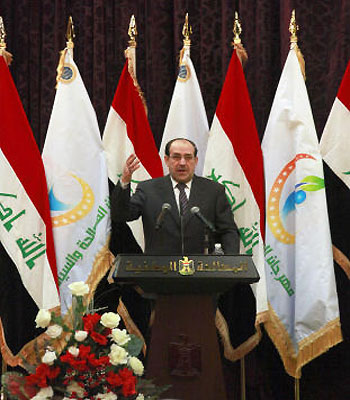
Iraqi Prime Minister Nuri al-Maliki speaks to the press in Baghdad, Iraq. (AP)
BAGHDAD, (Reuters) – Iraq’s Shi’ite prime minister, Nuri al-Maliki, has warned he will not tolerate Sunni anti-government rallies indefinitely, but made a concession to their demands by promising to free some women prisoners.
Thousands of Sunnis have been taking to the streets of Iraq for more than a week in protest against Maliki, whom they accuse of discriminating against their sect and being under the sway of their non-Arab Shi’ite neighbour Iran.
The incident has once more threatened to plunge a delicate power-sharing deal into turmoil, just as President Jalal Talabani, a moderating influence, is in Germany for medical care after suffering a stroke.
The cradle of the protests is Anbar province, a Sunni stronghold in western Iraq, where demonstrators are blocking a key highway to Jordan and Syria.
In a televised interview late on Monday, Maliki said there were foreign agendas behind the protests, which he described as “unconstitutional”.
“I say to those who follow these agendas: Don’t think it’s difficult for the government to take measures against you or to re-open the road and put an end to this matter,” Maliki said.
“We have been very patient with you, but don’t expect this issue to be open-ended.”
The protesters are demanding an end to what they see as the marginalisation of the Sunni minority, who dominated Iraq until the U.S.-led invasion of 2003 toppled Sunni dictator Saddam Hussein.
They want Maliki to abolish anti-terrorism laws that they say he has used to pursue political rivals such as the Sunni vice president, Tareq al-Hashemi, who fled after being accused of running death squads and was sentenced to death in absentia.
Sunni anger was re-ignited when Maliki evoked memories of that incident by detaining the bodyguards of his Sunni finance minister, Rafaie al-Esawi, hours after Talabani was flown out.
Leading Sunni cleric Khaled al-Mullah, a participant in negotiations between the protesters and the government, said Maliki had acceded to one Sunni demand.
“In our first meeting with Prime Minister Maliki, he promised us that he will write a special pardon for all women who have criminal charges,” Mullah said.
He put the number of female prisoners in Iraqi jails at 920, and said around 700 of them would be eligible for release.
Shi’ite cleric Moqtada al-Sadr, a rival of Maliki’s, voiced support for the protesters’ demands and said Iraq was not immune to the changes transforming the region.
“I have said before: The Arab Spring is coming and Iraq’s spring will come too,” Sadr told a news conference in the Shi’ite holy city of Najaf.

Shiite cleric Muqtada al-Sadr speaks during a press conference in the Shiite holy city of Najaf, 100 miles (160 kilometers) south of Baghdad. (AP)

Iraqis wave their national flag during a sit-in by citizens, clergy, tribal leaders and MPs, in the northern city of Samarra, in Salaheddin province, close to the Razzaq central mosque. (AFP)
